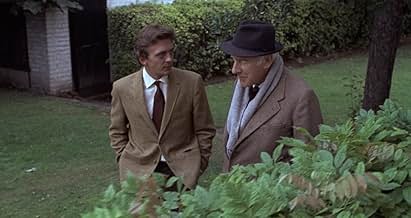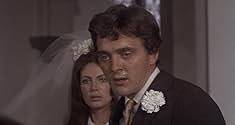NOTE IMDb
6,1/10
1,1 k
MA NOTE
Ajouter une intrigue dans votre langueReformed drug addict Tim Brett (David Hemmings) is vacationing in Italy with his aunt. When she is murdered, he tries to investigate. Soon his whole life spins out of control.Reformed drug addict Tim Brett (David Hemmings) is vacationing in Italy with his aunt. When she is murdered, he tries to investigate. Soon his whole life spins out of control.Reformed drug addict Tim Brett (David Hemmings) is vacationing in Italy with his aunt. When she is murdered, he tries to investigate. Soon his whole life spins out of control.
- Réalisation
- Scénario
- Casting principal
Wilfrid Hyde-White
- Mr. Copsey
- (as Wilfrid Hyde White)
Avis à la une
I thought that this was a brilliant thriller. Hemmings's character is the perfect foil, an admitted addict. He is like a mute who cannot scream at the horror enveloping him. Paranoia and fecklessness bounce off a genuine conspiracy. The tension is almost unbearable.
How much you like Fragment of Fear depends on how much you've seen of the type of film it is. David Hemmings believes some sort of peculiar conspiracy behind the murder of his rich aunt and he goes about his way to prove it back in London, except he gets his apartment broken into, strange messages and cackling laughter mysteriously appear on his tape recorder, and someone appears to have sent him a warning letter written on his own paper with his own typewriter. There's a girl on the side which he wants to marry and he's had a drug problem a few years back so that no one around him believes his ravings about a secret society out to silence him because he used to be a dope fiend. We even get the "we have no such person working here" mystery man cliché and if you're reading this, chances are you've seen variations of all this in one form or another.
So form is where the movie must distinguish itself except its ambitions never rise to the occasion. Great movies in this "losing a grip on reality" mystery/thriller niche were made at around the same time and Fragment of Fear can't measure up to them because a lot of what is ambiguous here is mostly a series of plot points and there's very little of a metaphorical/poetic nature, a key by which to render Hemmings' struggle a metaphor for something else. It can't measure up to something like Roeg's Don't Look Now or Weir's The Last Wave because this is still mostly a thriller, with all the noise and alarm and the sound and fury of a hunt, this not dying away in the distance to reveal something potentially meaningful about the condition of a fragile man trying to hold onto his pieces as his world bears him false witness, not until the end at least when the movie retreats with a maddened Hemmings inside his head for a final showpiece where "creepy old peoples' faces" stare ominously in the wide-angle lens of the camera and the the movie disappears on board a train through a dark tunnel and emerges on the other side on a grey lonely beachwalk where psychodrama and "twisty" horror thriller are allowed to finally converge.
This is not a bad movie by any means but something in it tells me Richard Sarafian may not have been the best man for the job. He turns in something that is competent and borderline successful but it lacks the intuitive mark of a director who's making his kind of film. The problem here is that the movie posits itself as something ambiguous except it's mostly literal and straightforward. When David Hemmings goes mad we know it not a second too late. Sarafian probably felt more comfortable in the grit and dust of Vanishing Point and Man in the Wilderness, films which are at once more metaphoric in their conception and poetic in execution, but it's still a bit puzzling that he didn't make something more out of Fragment of Fear.
So form is where the movie must distinguish itself except its ambitions never rise to the occasion. Great movies in this "losing a grip on reality" mystery/thriller niche were made at around the same time and Fragment of Fear can't measure up to them because a lot of what is ambiguous here is mostly a series of plot points and there's very little of a metaphorical/poetic nature, a key by which to render Hemmings' struggle a metaphor for something else. It can't measure up to something like Roeg's Don't Look Now or Weir's The Last Wave because this is still mostly a thriller, with all the noise and alarm and the sound and fury of a hunt, this not dying away in the distance to reveal something potentially meaningful about the condition of a fragile man trying to hold onto his pieces as his world bears him false witness, not until the end at least when the movie retreats with a maddened Hemmings inside his head for a final showpiece where "creepy old peoples' faces" stare ominously in the wide-angle lens of the camera and the the movie disappears on board a train through a dark tunnel and emerges on the other side on a grey lonely beachwalk where psychodrama and "twisty" horror thriller are allowed to finally converge.
This is not a bad movie by any means but something in it tells me Richard Sarafian may not have been the best man for the job. He turns in something that is competent and borderline successful but it lacks the intuitive mark of a director who's making his kind of film. The problem here is that the movie posits itself as something ambiguous except it's mostly literal and straightforward. When David Hemmings goes mad we know it not a second too late. Sarafian probably felt more comfortable in the grit and dust of Vanishing Point and Man in the Wilderness, films which are at once more metaphoric in their conception and poetic in execution, but it's still a bit puzzling that he didn't make something more out of Fragment of Fear.
Richard Sarafian is a decidedly underrated director. After finally seeing this, it's satisfying to report his VANISHING POINT was not a flash-in-the-pan. FRAGMENT...does not move at the same pace, nor does it get the viewer involved quite as quickly, but once you're about twenty minutes in, you're hooked until the end as Sarafian and screenwriter Dehn continually manipulate reality and our perceptions of it, along with lead character David Hemmings' perceptions of it. Really brilliant in the way it portrays a matter-of-fact unfolding of events that seem like a conventional, yet still insidious conspired-murder-by-blackmail-ring plot. But then we're constantly shown by the dialogue and actions of other characters that these events we've just witnessed may never have occurred. As an audience, we're constantly being shifted back and forth, momentarily convinced that recovering-addict-turned-successful-writer Hemmings is undergoing paranoid delusions, then the next moment convinced there really is a vast conspiracy against him and his investigation into his rich aunt's death. Disturbing and constantly involving, sucking the viewer in until the shocking conclusion. Unfortunately, the film's one real liability, which may in fact be the reason for some viewers' antipathy toward this film, is its totally inappropriate music score. Not only is the score mixed too loud on the soundtrack, it repeatedly draws attention to itself, often diffusing the effects Sarafian is trying to achieve. If only they had gotten someone like John Dankworth who could have composed a similar jazzy score but much more subtly and in keeping with the film's rhythms. Of course, even better would have been Ennio Morricone, someone who had already scored many Italian giallo thrillers that had attempted to play with reality in a similar way. Whomever hired Johnny Harris made a big mistake. His score is the one thing that keeps this from being a genuine little masterpiece.
An intriguing thriller with a fine, bewildered performance from David Hemmings.
Unfortunately, the film overdoses visually in bizarre for bizzare's sake with a very unsatisfactory ending.
It's a shame that while Fragment seems to be a latent classic, what frustrates is Hemmings' rather offbeat performance early on, rather at odds with the style and ambiance of the film. Also, the plot seems to be missing elements which were either cut, not filmed or deliberately left out to add to the jumbled nature of Tim's disintegration.
What is left is a paradigm of paranoid perfection with Tim's existential fate rendered powerless in the face of the crises his alternate path's absence creates.
His brain develops as many holes as he may have put in his arms, and he eventually disappears down a rabbit hole part Hitchcock, part Kubrick, part Antonioni.
The supporting cast are all exceptional with such household faces as Daniel Massey, Kenneth Cranham, Arthur Lowe and Philip Stone. Director Safarian was subsequently to make his best film Vanishing Point, placing Fragment as the nearly man in the careers of practically everyone involved.
If you enjoy your movies off centre and with a focus on style over substance, without paying consideration to tedious concerns like comprehensibility then you will find much to like here.
Le saviez-vous
- AnecdotesThe cast-list at the end of the film lists the octogenarian actress Hilda Barry as "Miss Dacey", a character who is referred to in the dialogue, but never actually appears in the film itself.
- GaffesDuring the wedding scene, Hemmings' character calls out for Major Ricketts and then switches to Colonel Ricketts by mistake.
- Citations
Maj. Ricketts: [discussing Aunt Lucy's death] She said no - "over my dead body". Hence, her dead body.
- Crédits fousThe role of Columbus (the pigeon whom Tim feeds outside his window) is credited as being played by "A London Pigeon"
- ConnexionsFeatured in Paul Dehn: The Writer as Auteur (2017)
Meilleurs choix
Connectez-vous pour évaluer et suivre la liste de favoris afin de recevoir des recommandations personnalisées
- How long is Fragment of Fear?Alimenté par Alexa
Détails
- Durée
- 1h 34min(94 min)
- Rapport de forme
- 1.85 : 1
Contribuer à cette page
Suggérer une modification ou ajouter du contenu manquant



































